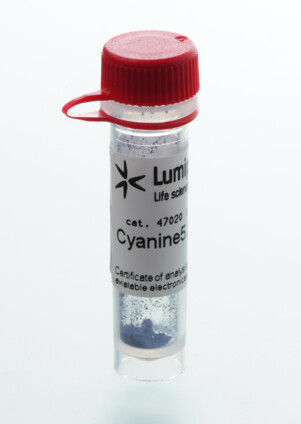DiD, lipophilic tracer
| Cat. # | Quantity | Price | Lead time | Buy this product |
|---|---|---|---|---|
| 3251-1mg | 1 mg |
–
|
in stock | |
| 3251-5mg | 5 mg |
$65
|
in stock | |
| 3251-50mg | 50 mg |
$238
|
in stock |

DiD is a far-red fluorescent carbocyanine dye for cell membrane labeling in vivo and in vitro. DiD diffuses laterally to stain the entire cell, allowing it to be used as an anterograde and retrograde tracer of neurons. In intact tissue, the dye does not transfer from labeled to unlabeled cells, but some transfer may occur when the membrane is disrupted, for example, after sectioning. The dye is weakly fluorescent until incorporated into membranes.
DiD can be used with other tracers in dual-color studies, such as DiI or DiO.
DiD is a solid form for the direct application of crystals to membranes.
Product in action
Absorption and emission spectra of DiD

Customers also purchased with this product
General properties
| Appearance: | dark blue solid |
| Molecular weight: | 987.38 |
| CAS number: | 75539-51-4 |
| Molecular formula: | C61H99IN2 |
| Solubility: | DMSO |
| Quality control: | NMR 1H and HPLC-MS (95+%) |
| Storage conditions: | 24 months after receival at -20°C in the dark. Transportation: at room temperature for up to 3 weeks. Desiccate. |
| MSDS: | Download |
| Product specifications |
Spectral properties
| Excitation/absorption maximum, nm: | 647 |
| Emission maximum, nm: | 666 |
Product citations
- Sindeeva, O.A.; Demina, P.A.; Kozyreva, Z.V.; Terentyeva, D.A.; Gusliakova, O.I.; Muslimov, A.R.; Sukhorukov, G.B. Single Mesenchymal Stromal Cell Migration Tracking into Glioblastoma Using Photoconvertible Vesicles. Nanomaterials, 2024, 14(14), 1215. doi: 10.3390/nano14141215
- Liu, X.; Cao, Z.; Liu, N.; Gao, G.; Du, M.; Wang, Y.; Cheng, B.; Zhu, M.; Jia, B.; Pan, L.; Zhang, W.; Jiang, Y.; He, W.; Xu, L.; Zhang, W.; An, Q.; Guo, Q.; Gu, J. Kill two birds with one stone: Engineered exosome-mediated delivery of cholesterol modified YY1-siRNA enhances chemoradiotherapy sensitivity of glioblastoma. Frontiers in Pharmacology, 2022, 13, 975291. doi: 10.3389/fphar.2022.975291


























 $
$ 
